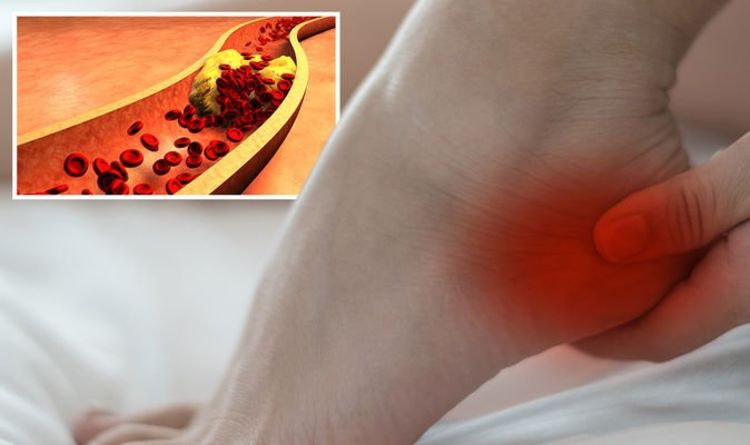High cholesterol symptoms: The hidden sign on your ankle of high cholesterol levels

High cholesterol means you have too much of a waxy substance called LDL cholesterol in your blood. LDL cholesterol is commonly dubbed the “bad” cholesterol because it can clog up your arteries and hike your risk of having a heart attack. Unfortunately, this process often goes undetected due to an absence of symptoms.
However, consistently high LDL levels cause perceptible changes to your Achilles tendon.
As the University of British Columbia (UBC) exclaims, LDL cholesterol can lead to a build-up of “yellowish deposits” in tendons.
“Similar to the way it builds up in blood vessels.”
UBC continues: “Due to the biochemical affinity between LDL and the collagen found in tendons, LDL escapes from the bloodstream and attaches to tendons, particularly the Achilles, becoming ever larger and harder, and causing inflammation that ultimately undermines the tendon’s structural integrity.”
READ MORE: High cholesterol: Pain in either of these four areas could indicate dangerous levels
How to test for high cholesterol
Most people will not experience high cholesterol symptoms so a blood test is required to diagnose it.
“Your GP might suggest having a test if they think your cholesterol level could be high,” explains the NHS.
According to the health body, this may be because of your age, weight or another condition you have (like high blood pressure or diabetes).
How to lower high cholesterol
Following a formal diagnosis, you’ll usually be required to make healthy lifestyle changes to lower high cholesterol.
There are several foods which are not just part of a healthy diet, they can actively help to lower your cholesterol too.
According to cholesterol charity Heart UK, cutting down on saturated fat and replacing some of it with unsaturated fats is a great way to lower your cholesterol.
Saturated fat is the kind of fat found in butter, lard, ghee, fatty meats and cheese.
Foods which contain unsaturated fats include:
- Vegetable oils such as olive, sunflower, corn, rapeseed, nut and seed oils
- Avocado, nuts and seeds
- Fat spreads made from vegetable oils, such as sunflower and olive oil
- Oily fish.
According to Heart UK, oily fish are a good source of healthy unsaturated fats, specifically a type called omega-3 fats, which boost heart health.
According to the NHS, you should also aim to do at least 150 minutes (2.5 hours) of exercise a week.
Some good things to try when starting out include:
- Walking – try to walk fast enough so your heart starts beating faster
- Swimming
- Cycling.
The NHS adds: “Try a few different exercises to find something you like doing. You’re more likely to keep doing it if you enjoy it.”





